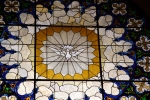May 2023
LGBTQ+ Pride
Do We Actually Want to Be Inclusive?
Several years ago, my husband (also a priest) and I were traveling overseas in a different Province of the Anglican Communion. We attended Holy Eucharist at the local cathedral on Sunday morning and afterward joined the congregation for coffee hour, where we met another clergy couple. This couple, heterosexual and older, were thrilled to welcome two gay priests who were married to one another, and we engaged in a conversation regarding everything from seminary training to the struggle their Province was having over human sexuality. When we began to discuss the sermon of the day, however, which was focused on one of the healing miracles of Jesus, they appeared shocked that we had enjoyed what we had heard that morning. The conversation shifted into a very dark place. While I will spare you the details, this pair of priests made it clear to us that they could not believe that “people like you” could believe such “outdated and old” theology. The conversation did not end well, and we quickly made our escape and headed toward the great cathedral doors.
I wish I could tell you that this was an isolated incident, but sadly it happens on a regular basis. We are welcomed into places with open arms, with smiles and acceptance, when people find out that we are married to one another – but the moment they realize we trend orthodox in our theology, we are boxed out and treated as an unwelcome nuisance in their mission to be “inclusive.” Over the years I have wondered a great deal about this and have attempted to understand the source of what can only be described as hostility. It seems to me that we have created an environment for ourselves in which we want to be “inclusive” only if those we welcome fit the idea of what we think they should be, feel, think, and believe. The couple that morning truly believed the only option for LGBTQ+ married priests was “progressive” theology, and any other position was simply a betrayal.
What does inclusion mean?
In the quest for inclusivity, the church has in fact created an environment of exclusivity in which we reject marginalized people who do not fit the prototype we have created in our heads. This phenomenon is not exclusive to the LGBTQ+ community, of course, but is frequently also targeted at people of color, women, the poor, and a host of others. When those whom the church takes great pride in welcoming turn out to be the “wrong kind” of LGBTQ+ person, or woman, or person of color, the hostility we are faced with is quick, intense, and painful. This is not inclusion, but the very definition of exclusion, and it needs to change.
No subculture is monolithic. Every group of people is made up of individuals who come with their own experiences, memories, beliefs, and unique perspectives. So perhaps rather than creating a culture in which we try to place marginalized people into neat boxes, we should seek to see all of God’s people as beloved individuals created in God’s own image.
The LGBTQ+ community includes orthodox and progressives, evangelicals and ex-evangelicals, Republicans and Democrats, pro-life and pro-choice, some who voted for Joe Biden and, yes, even some who voted for Donald Trump. Some deeply desire prayer book revision and others of us wish to retain the 1979 BCP – or even to reclaim the 1928 BCP. Some of us believe strongly in substitutionary atonement theology, while others embrace liberation theology. If the church is to preach inclusion, we must all actually be included, not cast into the shadows or ignored when we do not fit the ideal created for us by the great powers of the institutional church.
There are many members, yet one body
In St. Paul’s first letter to the church in Corinth he famously writes, “If all were a single member, where would the body be? As it is, there are many members, yet one body. The eye cannot say to the hand, ‘I have no need of you’, nor again the head to the feet, ‘I have no need of you.’”This description of the Body of Christ has inspired generations of Christians to strive for a more inclusive church, and we cannot lose sight of that goal. But if we are to be inclusive, we must seek to recognize the uniqueness of each person baptized into Christ’s Body. And that includes those who threaten our own vision of the ideal we strive to meet.
Twenty-five years ago when I first became an Episcopalian, I was warned not to disclose I was gay because it might hurt my chances of being ordained. Today, on more than a few occasions, it has been suggested that I keep my more orthodox theology silent so as to not create unnecessary roadblocks in my career. Having had both experiences, I look at any proclamations of inclusivity within the Episcopal Church with great suspicion. It is time for us to have a real conversation about what it means to be the Body of Christ – not an orthodox Body of Christ or a progressive Body of Christ, but the Body of Christ, made up of many parts but working together to proclaim the Gospel.
I live in hope, however. I live in hope because we are all sinners saved by the amazing grace of Jesus Christ, and he continues to renew his church and is constantly calling us to strive for that inclusion that we are always talking about. The church is a holy institution, full of sinful people, but with the guidance of the Holy Spirit we can truly be a house of prayer for all people, not just those who fit our preconceived notions and ideals. This is holy work. It is messy work. It is the real work of the Gospel.
Fr. Keith Voets is Rector of The Church of St. Alban the Martyr in Queens, New York, having previously served curacies in Connecticut and New York. Before his ordination in 2012, he had a decade-long career in hospitality management. Fr. Voets is a 2012 graduate of The General Theological Seminary and received a Master of Science Degree in Church Management from Villanova University in 2021. He is married to Fr. Kevin Morris and they have a son, Robert.
Resources:
- Embodying Hope by Ranjit K. Mathews, Vestry Papers, January 2023
- Talk with Millennials Not About Millennials by Br. Angel Gabriel, an ECF Vital Practices blog, May 17, 2019







